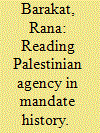| Srl | Item |
| 1 |
ID:
148602


|
|
|
|
|
| Summary/Abstract |
The British Mandate in Palestine was a time of significant change for the social character and demographic feel of Jerusalem. As it grew into a colonial capital and expanding cosmopolitan city, the city became home to a large number of non-elite Arab Palestinians, specifically the fellahin from the villages of the western corridor, who became central to Jerusalem's social, political, and economic life. A great deal has been written about Jerusalem's traditional families and their role in the development of the city as a national Palestinian capital, but not much is known about the contributions of Jerusalem's Arab residents beyond those families. In seeking to rectify that lacuna, this article focuses on the important historical moment of the Buraq Revolt, demonstrating how the city's evolution as a hub of mass resistance was driven by unprecedented demographic and social changes, resulting in the emergence of what may be called a “new Jerusalem.”
|
|
|
|
|
|
|
|
|
|
|
|
|
|
|
|
| 2 |
ID:
165584


|
|
|
|
|
| Summary/Abstract |
Posited as ‘post-national’ and articulated as ‘relational,’ recent historiography of the mandate period has had a long-term effect on how we read (and have been warned not to read) nationalism and resistance in Palestine. Beyond a critical survey of a select part of this recent historical literature, this essay shows how the question of nationalism has been framed in only one way and towards one end. Using this critical reading of the historical literature, this essay further attempts to open up space for a means of understanding Indigenous nationalism (and indigenous resistance) outside of the confined space of this particular treatment of nation-state nationalism. I suggest we move towards exploring an indigenous epistemological understanding of ‘history as story telling’ outside of these Zionist ontological constraints.
|
|
|
|
|
|
|
|
|
|
|
|
|
|
|
|